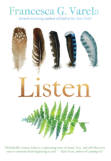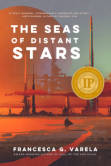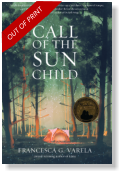
REVIEWS FOR BLUE MAR
In the not-so-distant future, two sisters must navigate a world that is
unraveling due to climate change. Wildfires blot out the sky, coastlines are
being washed away by rising seas, and the Great Pacific Garbage Patch has
been geo-engineered into an actual island called Blue Mar. When Laurel and
Paloma visit their Great-Aunt in El Salvador, they find that things are far
worse than in the U.S., so bad that many people are moving to Blue Mar to
start a new life. As they search for their identity and their place in the world,
Laurel and Paloma must decide whether to go to Blue Mar themselves, or
whether to stay, reconnect with their culture, and fight to save the land of
their ancestors.
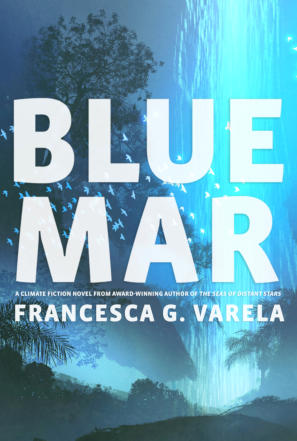
2025 Francesca Varela








WHERE TO BUY:
Blue Mar

Wholesale Orders: wayfarerbooks.org/contact-us
Publisher: Wayfarer Books
Release Dates: Second Edition August 5,
2024; First Edition March 16, 2021
Paperback: 260 pages
ISBN: 978-1965320181
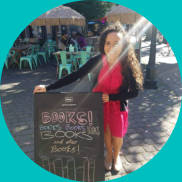
Other books by Francesca Varela:


HOW TO SHOW YOUR SUPPORT
•
Leave a rating on Goodreads or Amazon
•
Ask your local library to order Blue Mar
•
Ask your local indie bookstore to
stock Blue Mar
•
Recommend to friends/family


MEDIA FEATURES
Please Note: Due to a publication error, Blue Mar is listed under the author name ‘G. Varela’
instead of ‘Francesca G. Varela’ on some online databases.

Francesca G.
Varela






Did you know that I’m also a
freelance copy editor?

Blue Mar
WHERE TO BUY:




REVIEWS:
“Two sisters find very different
destinies in Francesca G. Varela’s
novel Blue Mar. Laurel and Paloma
have never been to El Salvador,
where their beloved Abuelo grew
up; gang wars fueled by climate
change have made Central America
too dangerous to visit. After
Abuelo’s unexpected death, they
decide to go anyway. While
spending the summer on their
family’s farm—now endangered by
flooding and extreme
weather—both women find new
perspectives on climate change,
and new dreams to fight for. The
relationship between Laurel and
Paloma is complex. While not
estranged, they struggle to
connect. Laurel is enthralled by a
corporation’s failed attempt to turn
plastic waste into an island resort,
and how the place has become a
rallying point for environmental
activists seeking to build a self-
sufficient utopia. Meanwhile,
Paloma, who thought she had her
future all figured out, now
questions her plans in light of
worsening climate change. The gap
between the sisters widens thanks
to their differing views on cultural
identity, the human toll of climate
change, and what humans owe to
each other and the world. The
story’s poignancy is enhanced by its
familiarity: though set in an
unspecified future, the picture it
paints of a world choking on plastic,
droughts, wildfires, new diseases,
and rising ocean levels is an eerie
echo of current events. The world
Laurel and Paloma inhabit—and the
decisions they make—will very soon
be a reality for too many people.
Blue Mar’s ultimate message,
however, is not one of despair. On
the contrary, it shows that, even in
hopelessness, there is hope—but it
must be earned, not given. Filled
with poetic turns of phrase and
foreboding visuals, Blue Mar is a
science fiction novel about
awakening to the reality that
everyone is responsible for
humanity’s well-being.”
Edith Gonzalez, Foreword
Review
“Barren fields and rising seas
juxtapose with iridescent birds,
sugar cane and bougainvillea in
Francesca G. Varela’s Blue Mar.
In Laurel and Paloma’s world,
hope, the color of turquoise, is
marketed as an island of plastic,
crafted from remnants of Barbie
dolls and Ziplock bags. But what
might our protagonists lose in
gaining a spot on this veritable
lifeboat? In a world of
uncertainty – and the author
hints that the world may have
always been just that – lies an
invitation to find one’s footing in
the unchangeable, in that which
always was and always will be.
Laurel senses in the humidity and
storm clouds, ‘the full width of
the ocean carried in each gust
and unfurled onto sand, and
concrete and coconut palms. This
was the air of her ancestors.’
Blue Mar speaks to the balance
between placing our hope in
human ingenuity, and
surrendering to the comfort of
human connection. The
proposition, irresistible because
we have no choice: ‘We will at
least be together when…’”
Margaret Hetherman,
science writer and futurist
“Blue Mar is a rare climate fiction
novel, one woven through the
emotional register of two sisters
facing a world in crisis. Francesca
Varela's writing is luminous and
powerful, transporting readers to a
not-so-distant future where the
worries that plague our planet
now have only been exacerbated
by human greed and disbelief. The
book features the kind of
worldbuilding that is both
ubiquitous and effortless, where
readers are likely to forget they're
reading a book with science fiction
elements because they're so
enraptured by the characters'
stories. A powerful meditation on
meaning and family set against
the backdrop of a world racked by
climate catastrophe. A work of
climate fiction for our times.”
S.E. Fleenor, managing
editor of Bella Media
Channel



Please Note:
Due to a publication error,
Blue Mar is listed under the
author name ‘G. Varela’ instead
of ‘Francesca G. Varela’ on
some online databases.
In the not-so-distant future,
two sisters must navigate a
world that is unraveling due
to climate change. Wildfires
blot out the sky, coastlines
are being washed away by
rising seas, and the Great
Pacific Garbage Patch has
been geo-engineered into
an actual island called Blue
Mar. When Laurel and
Paloma visit their Great-
Aunt in El Salvador, they
find that things are far
worse than in the U.S., so
bad that many people are
moving to Blue Mar to start
a new life. As they search
for their identity and their
place in the world, Laurel
and Paloma must decide
whether to go to Blue Mar
themselves, or whether to
stay, reconnect with their
culture, and fight to save
the land of their ancestors.


Wholesale Orders:
wayfarerbooks.org/contact-us
Publisher: Wayfarer Books
Release Dates: Second Edition August 5,
2024; First Edition March 16, 2021
Paperback: 260 pages
ISBN: 978-1965320181
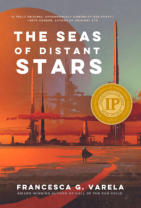
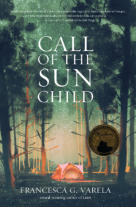
Other books by
Francesca Varela:
HOW TO SHOW
•
Leave a rating on Goodreads or
Amazon
•
Ask your local library to order
Blue Mar
•
Ask your local indie bookstore
to stock Blue Mar
•
Recommend to friends/family


MEDIA FEATURES:
o
Foreword Review
o
Book Riot
o
Eugene Weekly
o
The Register-Guard
o
Willamette Writers
o
Utah Alumni
o
UO Alumni
o
Latinx Life
o
Locus Online
YOUR SUPPORT


www.francescavarela.com
Francesca G. Varela




























